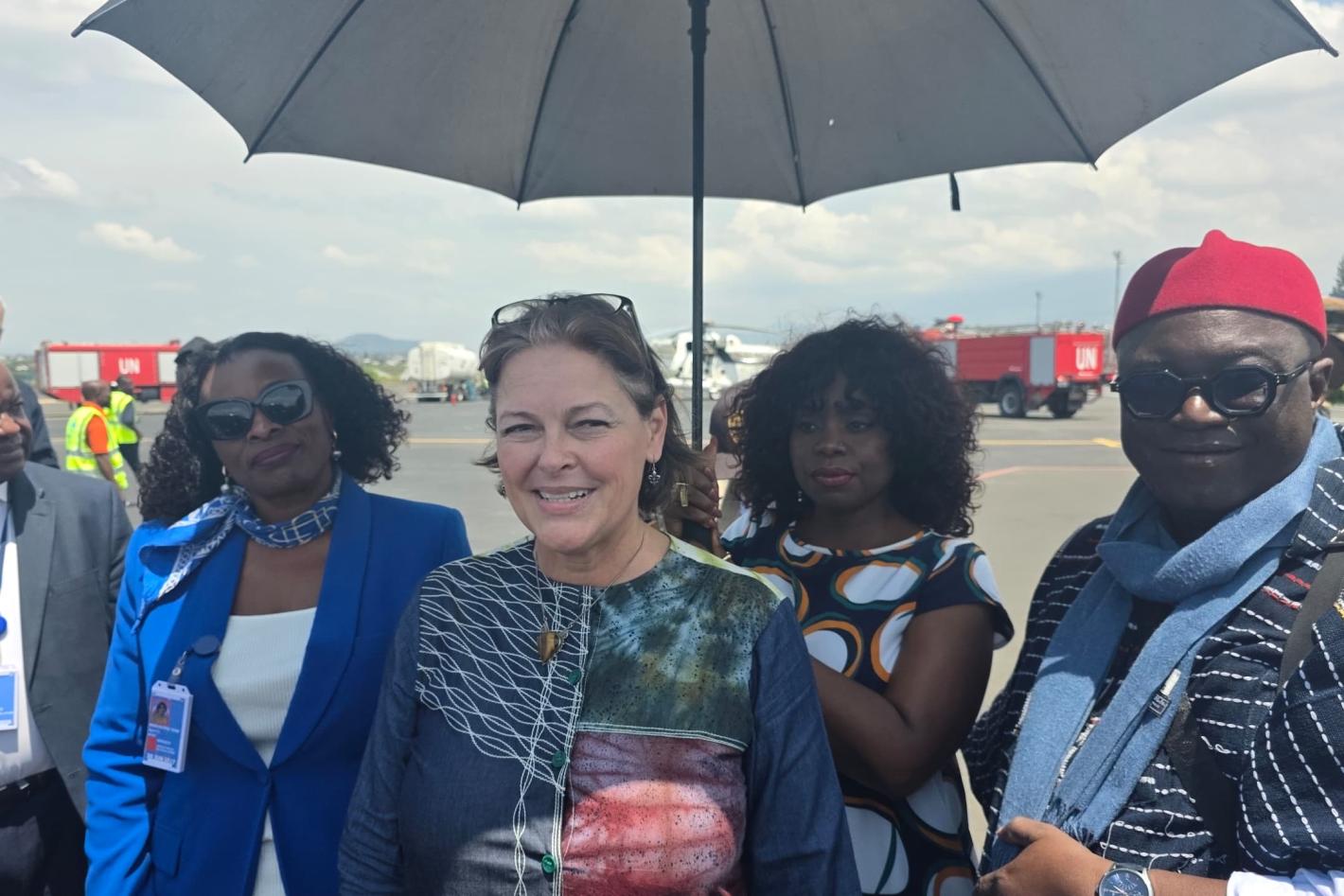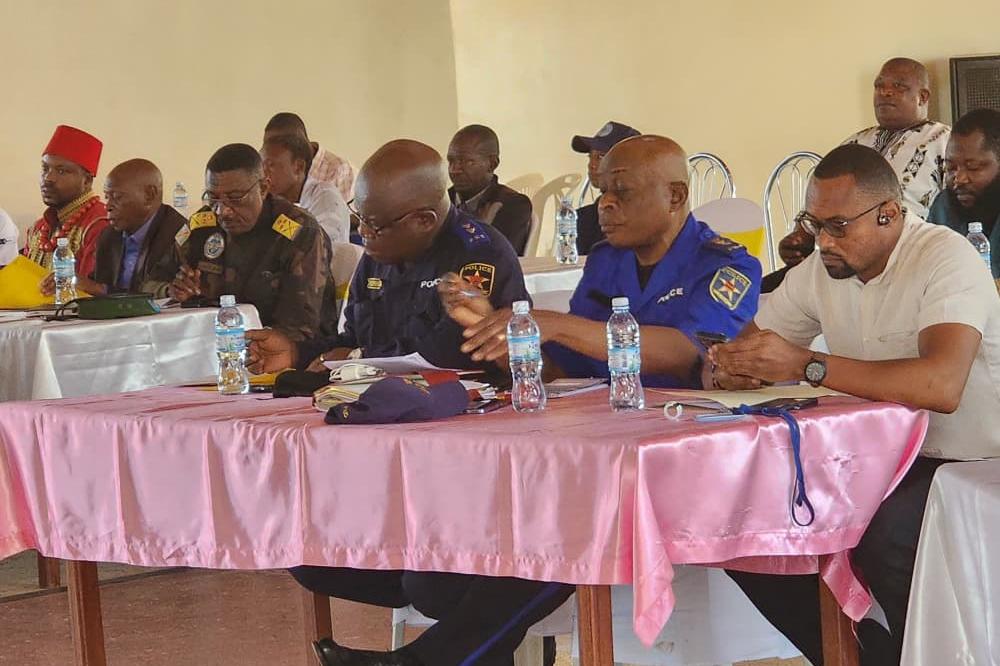Statement by SRSG Maman Sidikou
to the Open Session of the UN Security Council
21 March 2017
Monsieur le Président,
Distingués membres du Conseil,
Je vous remercie de l’opportunité que vous m’offrez de m’entretenir avec vous aujourd’hui au sujet de la situation en République démocratique du Congo (RDC).
Comme le souligne si bien le Rapport du Sécrétaire général sur la Mission de l’Organisation des Nations Unies pour la stabilisation en République démocratique du Congo (MONUSCO) daté du 10 mars, le contexte politique et sécuritaire en RDC a connu de profonds changements durant les mois écoulés, nécessitant par conséquent un ajustement des priorités et de la posture de la MONUSCO.
La mise en oeuvre intégrale de l’Accord politique du 31 décembre 2016 qui ouvre de la façon la plus claire la voie à la tenue des élections requiert tout le soutien des Nations Unies.
Certains blocages devront cependant être levés. La majorité au pouvoir et le Rassemblement ont des points de vue divergents sur les modalités de désignation du Premier ministre et de répartition des portefeuilles clés des ministères des affaires étrangères, de l’intérieur, de la défense et de la justice du gouvernement de transition qui sera formé. Le rôle que pourrait jouer la Conférence épiscopale nationale du Congo(CENCO) à l’issue de la finalisation de “l’Arrangement particulier” est aussi source de discorde.
La mort d’Etienne Tshisekedi a eu un impact significatif sur le processus politique en RDC, retardant davantage la finalisation de “l’Arrangement particulier”, la désignation du Premier Ministre et l’établissement du Comité national de suivi de l’Accord et du processus électoral (CNSA).
Aussi longtemps que le dialogue politique demeure dans une impasse, les tensions risquent de monter. En février, des séminaires et paroisses de l’Eglise catholique à Kananga, Kinshasa et Lubumbashi ont été attaqués, vraisemblablement à cause des frustrations accrues au sein de certains segments de la population qui voient le processus politique s’enliser.
Il me plait toutefois de noter que la situation semble évoluer dans le bon sens depuis quelques jours. La désignation du Secrétaire général adjoint de l'Union pour la démocratie et le progrès social (UDPS), Felix Tshisekedi comme Président du Rassemblement et d'un représentant du Groupe des sept (G7), Pierre Lumbi à la tête du Conseil des sages du Rassemblement constitue une avancée importante qui a permis la reprise le 16 mars, sous les auspices de la CENCO, des négociations sur "l'Arrangement particulier." De plus, les Présidents des deux chambres du Parlement ont appelé à un processus électoral irréversible et crédible et exprimé leur soutien aux efforts de la CENCO.
Nonobstant les retards enregistrés dans le processus politique, des avancées significatives ont été faites dans la mise à jour du fichier électoral. A ce jour, plus de 19 millions d'électeurs ont été enrôlés et le processus d'enrôlement est en passe de débuter dans les deux zones opérationnelles d'enrôlement restantes.
L'appui logistique et technique de la MONUSCO au processus d'enrôlement arrivera à terme à la fin de ce mois. A cette date la MONUSCO aura transporté approximativement 3 000 tonnes de matériels d'enrôlement à travers la RDC. Si le Conseil de sécurité l'autorise, la MONUSCO est disposée à apporter un soutien technique et logistique au processus électoral qui irait au-delà de la mise à jour du fichier électoral.
Mr. President,
The deteriorating security situation in the DRC remains a source of major concern. As noted in the report of the Secretary General, violence and threats to civilians are no longer concentrated in the Eastern DRC.
Community-based violence and inter-ethnic clashes have spread from areas already affected by armed conflict, such as the Kivus, to Tanganyika, the three Kasai provinces, Lomami and Kongo Central. Armed group activity in the East has also increased, particularly of late with the resurfacing of former M23 elements.
The conduct of coordinated operations by the FARDC and MONUSCO against armed groups in the Eastern DRC have helped maintain military pressure on the ADF, the FDLR and the FRPI, disrupting their activities. The FARDC has also been involved in actions against elements of the former M23 movement, which had recently crossed into DRC territory.
The resurgence of violence in certain areas in the rest of the country has been exacerbated by the uncertain political situation, as well as the manipulation of grievances for political ends, and the provision of support to armed militias by some political actors. The increasing use of self-defense militia, acting along ethnic lines, points to a growing sense of insecurity and uncertainty.
The risk of electoral violence also remains high, mainly in urban areas. This is likely to rise further, the longer the implementation of the 31 December Agreement is stalled, prolonging the current political uncertainty.
The spread of violence has been characterized by a significant increase in human rights violations. The year 2016 witnessed a 30 percent increase in human rights violations compared to 2015, with MONUSCO documenting a total of 5,190 human rights violations throughout the DRC. State agents were responsible for 64 percent of these, and armed groups were responsible for the remaining 36 percent.
I am particularly concerned by reports of the excessive use of force, human rights violations and the presence mass graves in the Kasai provinces. I have encouraged the Government of the DRC to conduct thorough investigations and to ensure that the perpetrators of these acts are held to full account. MONUSCO stands ready to provide its full support to the conduct of these investigations.
I would like to emphasize again that only political solutions can address and stem the rising levels of violence now being witnessed in the DRC.
On our part, MONUSCO remains fully engaged in protecting and promoting human rights and political space and is strongly engaging with the relevant authorities on a regular basis to ensure that perpetrators of human rights violations are held accountable for their actions, and are brought to justice. MONUSCO is also strictly applying the Human Rights Due Diligence Policy for any and all support provided to state security actors in the implementation of its mandate.
I am also deeply concerned by the deteriorating socio-economic and humanitarian situation in the DRC. The continued depreciation of the Congolese Franc, which has lost over 30 percent of its value in the last year, the lack of foreign currency reserves, and the fiscal shortfall are increasingly impacting on the livelihoods of Congolese citizens, and will continue to do so in the coming months.
These developments are coupled with a deteriorating humanitarian situation due to the intensifying violence. A total of 2.2 million persons are currently forcibly displaced. In Tanganyika province alone, violence forced some 102,000 persons into displacement in the last quarter of 2016, while the violence in the Kasais had displaced an estimated 225,000 persons by the end of January this year.
The 2016 Humanitarian Response Plan was funded at just over 60 percent, placing pressure on the humanitarian community to respond to these new displacements. At the same time, refugees from South Sudan continue to cross into the DRC, with UNHCR having registered 28,000 refugees in areas close to the South Sudanese border by January this year.
Mr. President,
As has been highlighted in the report of the Secretary General, the 31 December Agreement provides a clear path towards the holding of elections, setting the stage for MONUSCO’s drawdown and exit. The Mission’s main strategic objective during the coming months will therefore be to support the establishment of an environment conducive to the timely holding of peaceful, credible and inclusive elections, in accordance with the provisions of the Agreement.
Accordingly, MONUSCO has already undertaken adjustments to its posture and operations. The Mission will continue to make such adjustments as may be required in the months ahead to ensure that it is well positioned to use the full range of tools and resources at its disposal to support the political and electoral process, contribute to the protection of civilians, and assist with stabilization efforts.
The Mission has provided its full support to the CENCO-led dialogue efforts and in the updating of the voter register. It has strengthened its civilian and military presence and operations in new areas of concern outside Eastern DRC, specifically the Kasais and Tanganyika. We have also initiated a process of shifting key functions from Goma to Kinshasa, to strengthen the Mission headquarters. I have requested that the MONUSCO protection of civilians strategy be revised to address the threat to the civilian population from armed groups in Eastern DRC, the spreading ethnic and militia violence in new areas of concern, and possible electoral violence in urban areas.
The report of the Secretary-General also sets out a package of measures aimed at enhancing the ability of the MONUSCO Force to support the achievement of the Mission’s strategic objectives in the current challenging security context through the adoption of a more mobile, flexible and agile posture. The Secretary-General has recommended the deployment of two additional formed police units (FPUs) to help the Congolese authorities address the potential threat of electoral and politically motivated violence in key urban centers where there is no FPU presence.
Mr President,
The primary responsibility for the implementation of the Agreement rests with its signatories, and will require the same level of commitment and compromise which led to its signing on 31 December. MONUSCO will continue to provide support for the implementation of the Agreement, while supporting efforts to address the mounting threats faced by the civilian population during the transition period.
I thank you for the opportunity provided to brief the Council today, and look forward to the ensuing discussions.






